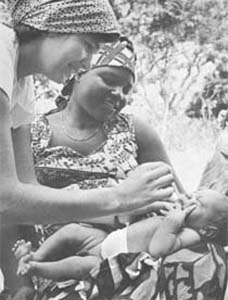October 15, 2004: Headlines: COS - Gambia: HIV: AIDS: AIDS Education: Harvard Public Health NOW: After spending four years studying biology at the University of Pennsylvania, Timothy Mah joined the Peace Corps and journeyed to The Gambia in 2001, hoping to educate young people about HIV/AIDS
Peace Corps Online:
Peace Corps News:
Library:
Peace Corps: AIDS Education :
The Peace Corps and AIDS Education:
October 15, 2004: Headlines: COS - Gambia: HIV: AIDS: AIDS Education: Harvard Public Health NOW: After spending four years studying biology at the University of Pennsylvania, Timothy Mah joined the Peace Corps and journeyed to The Gambia in 2001, hoping to educate young people about HIV/AIDS
After spending four years studying biology at the University of Pennsylvania, Timothy Mah joined the Peace Corps and journeyed to The Gambia in 2001, hoping to educate young people about HIV/AIDS

After spending four years studying biology at the University of Pennsylvania, Timothy Mah joined the Peace Corps and journeyed to The Gambia in 2001, hoping to educate young people about HIV/AIDS
After spending four years studying biology at the University of Pennsylvania, Timothy Mah joined the Peace Corps and journeyed to The Gambia in 2001, hoping to educate young people about HIV/AIDS. He expected to dispense advice on subjects such as safe sex. He did not expect to first need to convince people that HIV existed.
"My initial job was to make people believe HIV was real," said Mah, now a master’s degree student at HSPH, at a Global Chat on September 29 in Kresge 213. "People generally did not talk about it." He later spoke with HPH NOW in a follow-up interview.
The Gambia is one of the smallest and one of the poorest African nations. When he arrived there, Mah, a native of Canton, Massachusetts, lived with a couple and their five children in a small village on the Atlantic coast. It took nine months for him to learn the language and figure out how he would approach the work he was sent to do.
Over the course of two years, Mah set up several small-scale HIV-prevention and education programs, working mainly in schools. When he initially coaxed young people into discussions about HIV/AIDS, he discovered a tangle of conspiracy theories and worries that reflected issues of culture, religion, and the legacy of Western colonialism. Some youth flat out denied that HIV existed. Some wondered why more Africans were dying from HIV/AIDS than Westerners if the virus was "discovered" in France and the U.S. Others challenged how a virus initially so closely associated with gay men in the West could be spreading in Africa since, the youth asserted, there are no homosexuals in Africa. Some charged that community-based AIDS prevention programs–with their emphasis on safe sex and abstinence–were veiled plots to reduce the population of Africa.
The anxieties over the origin of HIV/AIDS were compounded by a number of issues. Nearly seventy percent of adult women in the country are illiterate, said Mah. People infected with HIV generally are reluctant to discuss their status because infection carries a heavy social stigma. Testing at the time was only done at a handful of maternity clinics scattered across the countryside, so few people knew their status. There was virtually no treatment available to those who tested positive. The only way to get condoms was through clinics set up by the national health system, and the lack of availability led to sexually active young people reporting they had washed used condoms or turned them inside out so they could be re-used, he said.
Mah decided to focus his efforts on small groups of young people, using schools as a means to reach them. He conducted workshops, inviting HIV-positive Gambians as speakers. "My hope was that seeing truly would mean believing," he explained. "Some kids had heard you could get AIDS by stepping over dog urine or sharing a food bowl or cup with someone who has the disease." For many of the students, the HIV-infected speakers represented the students’ first opportunity to knowingly interact and question fellow Gambians living with the virus.
At a soccer training camp for teenage boys, Mah delivered a basic peer health education program, which included a strong HIV/AIDS prevention component. Among the skills he wanted to the boys to develop were those necessary for decision-making, negotiating, and good interpersonal communication. "In a lot of schools, boys have little experience speaking directly to elders or their girlfriends about using protection during sex," said Mah. "Developing these life skills will help them bridge those gaps."
After graduating from HSPH, Mah would like to continue focusing on AIDS prevention through field-program development work for an NGO and hopes to return one day to The Gambia.
--PHC
Harvard Public Health NOW is published biweekly by the
Office of Communications
Harvard School of Public Health
665 Huntington Ave., SPH 1-1312
Boston, Massachusetts 02115
617-432-6052
Editor and Layout: Christina Roache
Contributing Writers: Paula Hartman Cohen, Pat McCaffrey
Photos Credits: Suzanne Camarata, Office for Resource Development
When this story was posted in February 2005, this was on the front page of PCOL:
 | The Peace Corps Library
Peace Corps Online is proud to announce that the Peace Corps Library is now available online. With over 30,000 index entries in over 500 categories, this is the largest collection of Peace Corps related reference material in the world. From Acting to Zucchini, you can use the Main Index to find hundreds of stories about RPCVs who have your same interests, who served in your Country of Service, or who serve in your state. |
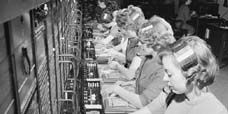 | Make a call for the Peace Corps
PCOL is a strong supporter of the NPCA's National Day of Action and encourages every RPCV to spend ten minutes on Tuesday, March 1 making a call to your Representatives and ask them to support President Bush's budget proposal of $345 Million to expand the Peace Corps. Take our Poll: Click here to take our poll. We'll send out a reminder and have more details early next week. |
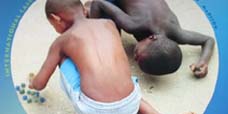 | Peace Corps Calendar:Tempest in a Teapot?
Bulgarian writer Ognyan Georgiev has written a story which has made the front page of the newspaper "Telegraf" criticizing the photo selection for his country in the 2005 "Peace Corps Calendar" published by RPCVs of Madison, Wisconsin. RPCV Betsy Sergeant Snow, who submitted the photograph for the calendar, has published her reply. Read the stories and leave your comments. |
 | WWII participants became RPCVs
Read about two RPCVs who participated in World War II in very different ways long before there was a Peace Corps. Retired Rear Adm. Francis J. Thomas (RPCV Fiji), a decorated hero of the Japanese attack on Pearl Harbor, died Friday, Jan. 21, 2005 at 100. Mary Smeltzer (RPCV Botswana), 89, followed her Japanese students into WWII internment camps. We honor both RPCVs for their service. |
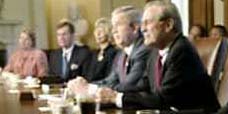 | Bush's FY06 Budget for the Peace Corps
The White House is proposing $345 Million for the Peace Corps for FY06 - a $27.7 Million (8.7%) increase that would allow at least two new posts and maintain the existing number of volunteers at approximately 7,700. Bush's 2002 proposal to double the Peace Corps to 14,000 volunteers appears to have been forgotten. The proposed budget still needs to be approved by Congress. |
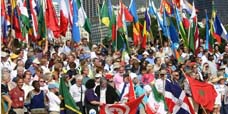 | RPCVs mobilize support for Countries of Service
RPCV Groups mobilize to support their Countries of Service. Over 200 RPCVS have already applied to the Crisis Corps to provide Tsunami Recovery aid, RPCVs have written a letter urging President Bush and Congress to aid Democracy in Ukraine, and RPCVs are writing NBC about a recent episode of the "West Wing" and asking them to get their facts right about Turkey. |
 | Ask Not
As our country prepares for the inauguration of a President, we remember one of the greatest speeches of the 20th century and how his words inspired us. "And so, my fellow Americans: ask not what your country can do for you--ask what you can do for your country. My fellow citizens of the world: ask not what America will do for you, but what together we can do for the freedom of man." |
Read the stories and leave your comments.

Some postings on Peace Corps Online are provided to the individual members of this group without permission of the copyright owner for the non-profit purposes of criticism, comment, education, scholarship, and research under the "Fair Use" provisions of U.S. Government copyright laws and they may not be distributed further without permission of the copyright owner. Peace Corps Online does not vouch for the accuracy of the content of the postings, which is the sole responsibility of the copyright holder.
Story Source: Harvard Public Health NOW
This story has been posted in the following forums: : Headlines; COS - Gambia; HIV; AIDS; AIDS Education
PCOL17343
96
.




